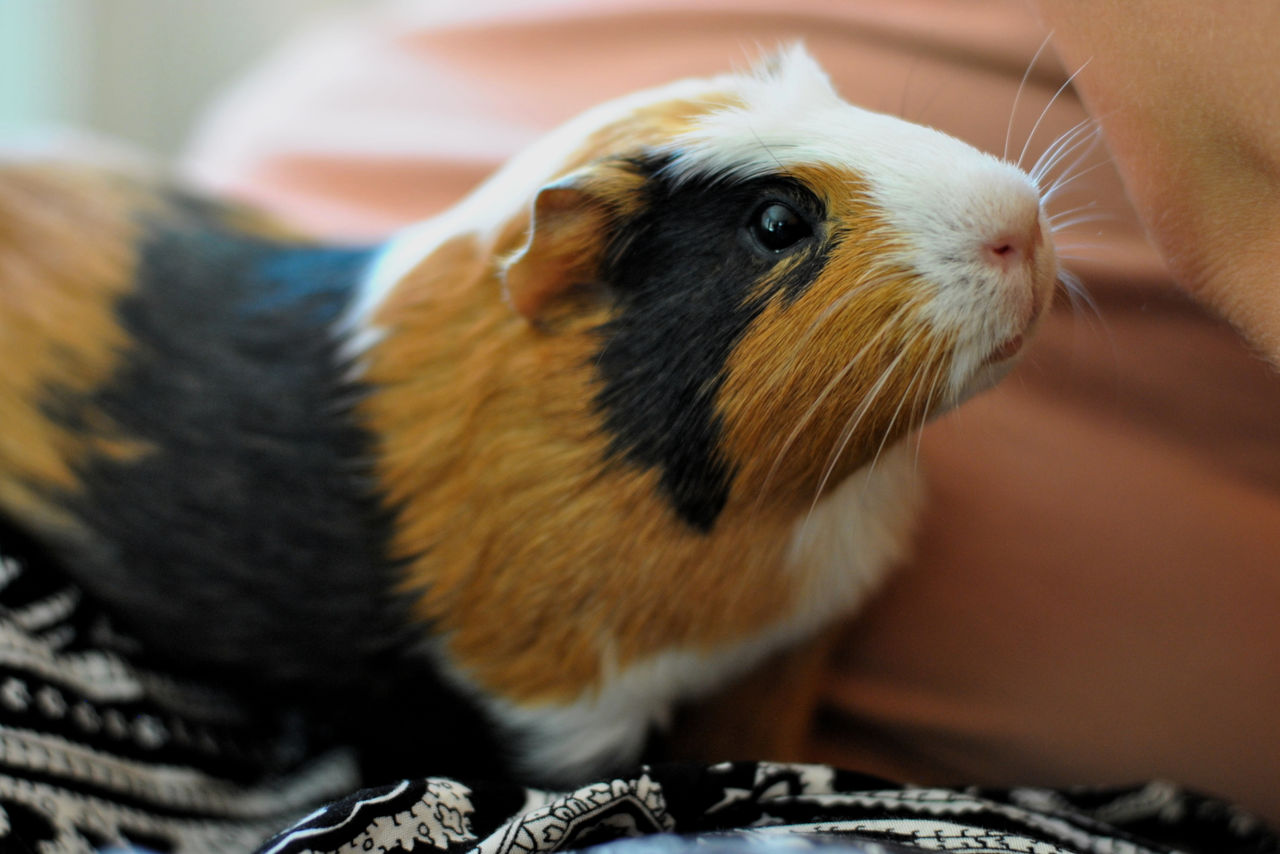Artichokes are an edible vegetable with a high fiber content and numerous health benefits. As a guinea pig owner, you may wonder whether guinea pigs can eat artichokes. Is it safe for them?
Guinea pigs are allowed to eat artichokes. However, you must remove the outer leaves and the prickly part of each leaf before serving them to your guinea pigs. Guinea pigs are only allowed to eat the green and white leaves of the artichoke. Never feed too much at once, and limit the frequency to a maximum of 2-3 times a week.
The artichoke originates mainly from the Mediterranean regions, possibly Tunisia and Sicily. However, it is also grown in parts of the US, North Africa, Italy, Spain, and France.
This vegetable is low in calories and provides many essential minerals and vitamins to help guinea pigs stay fit and healthy.
Can Guinea Pigs Eat Artichokes?
Giving your guinea pigs artichokes in small quantities is no problem.
However, as artichokes contain a lot of phosphorus and calcium, feeding only a small amount is recommended to avoid adverse effects.
Most guinea pigs like to eat artichokes because they taste mildly and slightly sweet. But not all guinea pigs like this taste.
This vegetable can enrich your guinea pig’s diet with a different flavor, offering various nutritional benefits.
Are Artichokes Poisonous Or Dangerous for Guinea Pigs?
Artichokes are not poisonous or dangerous for guinea pigs if fed in moderation. However, too much can lead to various health problems.
This is because artichokes contain a fair amount of phosphorus and calcium.
A diet high in calcium could lead to bladder stones in guinea pigs. It is, therefore, better to feed artichokes to your guinea pigs only in moderation.
Here are some potential dangers you should be aware of before feeding artichokes to your guinea pigs:
- Urinary tract complications: artichokes contain high levels of calcium. This mineral can contribute to the formation of healthy bones but should not be fed in excessive amounts to adult guinea pigs. Too much calcium can cause bladder stones, urinary tract infections, and urinating pain. It can even lead to kidney failure.
- Digestive problems: Artichokes contain a moderate amount of phosphorus, which can lead to various health problems in guinea pigs, including gastrointestinal issues and diarrhea.
- Choking hazard: Artichokes can be difficult for young guinea pigs to chew and swallow. Not only are they challenging to eat, but they also pose a choking hazard. Young guinea pigs, in particular, have difficulty ingesting such food and should avoid it from the outset.
Are Guinea Pigs Allergic to Artichokes?
No, guinea pigs are not allergic to artichokes. However, make sure you remove the outer layer of the leaves and the stem and cut off the sharp ends of the leaves, as they cannot eat them.
These could cause various health problems in your guinea pigs.
The artichoke is not poisonous, but overeating artichoke can have serious consequences.
An excessive portion of artichokes can cause side effects such as allergic reactions and bloating. However, feeding guinea pigs artichokes in moderation is not a problem.
When you give your guinea pigs artichokes for the first time, you should observe the animals for 12 hours. Observe their reaction to the food and then feed them accordingly.
Artichokes have a fresh and earthy flavor, like most vegetables. Also, as mentioned above, artichokes contain a lot of phosphorus.
You should, therefore, only feed them in small quantities to avoid health problems.
What Are the Health Benefits of Artichokes for Guinea Pigs?
Artichokes are suitable for guinea pigs in small portions. As long as they are fed in moderation, there is no harm in giving them artichokes.
Artichokes are packed with essential nutrients, which is always beneficial for guinea pigs. Artichokes are also low in calories and fat.
Let’s take a closer look at the health benefits artichokes have for guinea pigs:
- Healthy body growth: artichokes are a good vitamin A source, which helps prevent various health problems and diseases in guinea pigs.
- It strengthens the immune system and helps promote teeth and bone growth in guinea pigs.
- Vitamin A protects guinea pigs from various health problems and supports bone growth.
- Fiber: Artichokes are a good source of fiber. This fiber helps guinea pigs in many ways. They help maintain cholesterol levels and promote regular bowel movements in guinea pigs. High levels of fiber also help them to lower the sugar levels in their bodies.
- Helps with weight loss: Artichokes are rich in nutrients but have few calories. This helps guinea pigs to maintain their weight. In addition, the fiber contained in artichokes helps to lower blood sugar levels.
- Prevents serious diseases: Artichokes are rich in antioxidants that help fight free radicals. The antioxidants contained in artichokes also have anti-cancer properties. They help to reduce the growth of cancer cells.
- Prevents scurvy: Artichokes contain an ideal amount of vitamin C, which is vital for guinea pigs as their bodies cannot produce it on their own. Vitamin C also helps to prevent scurvy in guinea pigs, which is usually caused by a lack of vitamin C in the body.
How Many Artichokes Can Guinea Pigs Eat at Once?
Artichokes are more of a treat for guinea pigs. It would be best not to feed them more than a few artichoke leaves at a time. They should also only be given raw artichokes.
You should also avoid giving them the outer leaves as they are a little sour, which is unsuitable for guinea pigs.
Artichokes have a high phosphorus and calcium content, which guinea pigs cannot digest properly in large quantities.
It can also cause bladder stones in guinea pigs. It is therefore recommended to feed only a small amount of this vegetable in one portion.
A small amount will not be a problem, but excessive feeding can make your guinea pigs sick.
How Often Can Guinea Pigs Be Given Artichokes?
It is recommended to feed artichokes in moderation and small quantities.
You should, therefore, not feed artichokes to your guinea pigs more than 2-3 times a week.
Generally, guinea pigs can consume this vegetable but should not become accustomed to being served it regularly.
However, a few guinea pigs show signs of discomfort when overfed. It is best to observe their reaction to this and react accordingly.
Can Baby Guinea Pigs Eat Artichokes?
Baby guinea pigs should not eat even a tiny amount of artichoke.
Guinea pig babies have a fragile digestive system and are, therefore, unable to digest such foods.
In addition, artichokes are slightly acidic, which can be very harmful to baby guinea pigs.
Can Guinea Pigs Eat Raw Artichokes?
Yes, guinea pigs can eat raw artichokes. Cut off the tough outer leaves and the pointed ends of the leaves before feeding them to your guinea pigs.
However, it would be best to serve artichokes only in moderation as they contain a lot of phosphorus.
In general, guinea pigs should only be given raw vegetables and fruit. Prepared foods are not suitable for them.
No matter whether it is cauliflower, tomatoes, celery, parsnips, or any other food.
Can Guinea Pigs Eat Artichoke Plant Leaves?
Guinea pigs should not eat artichoke plant leaves. Artichoke leaves have a rough texture and are pretty prickly at the end, which can injure guinea pigs if they eat these leaves.
They also contain some chemicals, such as cynarin and chlorogenic acid, which can harm guinea pigs. It would be best to avoid them altogether.
Can Guinea Pigs Eat the Outer Leaves of the Artichoke?
Guinea pigs are not allowed to eat the outer leaves of the artichoke. The outer leaves of the artichoke are firmer than the inner layer and only have a small part that contains edible material.
In addition, the outer leaves are not safe for guinea pigs as they are difficult to digest. Feeding the outer leaves of artichokes can lead to choking.
How to Prepare Artichokes for Guinea Pigs?
It is quite simple to prepare artichokes for guinea pigs. Below are some steps to follow when preparing artichokes:
- The first step is to choose fresh and slightly heavy artichokes. If the artichokes are light, they are probably a little dried out and not as meaty as they should be. Make sure that the artichokes are not wilted or dried out.
- Next, you need to remove the outer leaves. Once the outer leaves are removed, use only the lighter green and white leaves.
- Then, you should remove the sharp leaf tips at the end of each leaf. The thorny parts can injure your guinea pigs if you don’t remove them.
- Then, cut the leaves into small pieces of a suitable size. You can also feed them without cutting them into pieces.
- The final step is to remove the uneaten artichokes from the cage. Uneaten food can attract vermin and will eventually go moldy.
Conclusion: Can Guinea Pigs Eat Artichokes?
Guinea pigs are allowed to eat artichokes, but only in small quantities. Artichokes contain many essential nutrients that are beneficial for the animals.
These include vitamins A, C, and K, iron, potassium, magnesium, phosphorus, and fiber.
Artichokes are somewhat sweet and contain moderate amounts of phosphorus and calcium. These can harm guinea pigs and cause bladder, digestive, and many other health problems.
Giving your guinea pigs a few artichoke leaves at a time would be best. Only feed them artichokes 2-3 times a week.
Overfeeding can cause allergic reactions in some guinea pigs. You should, therefore, only feed a small amount at a time.
Make sure that you remove the outer leaves of the artichokes, as they are somewhat sour and very hard. Only use the white and light green inner leaves.
It would be best to cut off the sharp ends of the artichokes. These could harm the guinea pigs.
Only use fresh artichokes. Dried, pickled, or cooked artichokes should not be fed.


